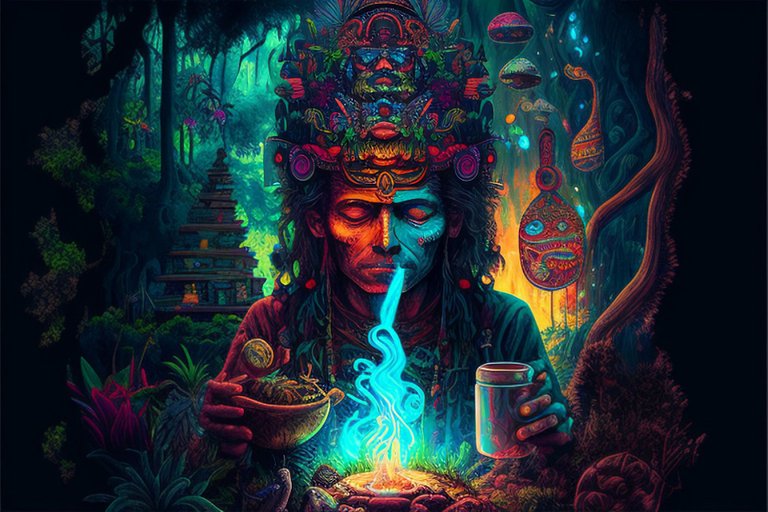Shamanism - what you should know while looking for sacred medicine and guidance
[polish version below] [photos used - free photos from pixabay.com]

Shamanism has been undergoing a renaissance in recent years, and the use of spiritual healers has even become a fashionable topic. The word "shaman" itself comes from the languages of East Siberian peoples and means the same as wizard/ witch - in free translation, one who knows.
Until 20 years ago, in European culture, shamanism was associated only with the wildest and most remote corners of the Earth, mainly due to technological advances and the 20th century's ingrained belief in the backwardness of civilization associated with such practices. As of today, the popularity of all sorts of holistic healers and people providing "spiritual services" makes it clear that this view has not stood the test of time, and the role of the shaman in society is an important link for its proper functioning.

Who is a shaman?
In cultures around the world, the image of the shaman varies significantly, depending on the climate zone and prevailing beliefs, but several common traits characterize these figures. The ability to enter an ecstatic trance and the ability to connect with the spiritual world are among the basic elements. Shamans around the world use instruments (most often drums) in their practices, sing specific songs or use vocalizations, and use psychoactive drugs designed to put them into a deep trance, which is a transformative journey into the spiritual world. In doing so, they often take on the role of guides who, acting from altruistic motives, obtain answers to questions that concern the community as a whole or guide specific individuals to self-discovery and the discovery of truth within themselves.
The rise in popularity of shamanism has led to a rash of pseudo-shamans and fake healers who have courted the source of achievement while ignoring the most important goal, which is to heal people at every level of their existence. In some cases, a person going to such a scammer not only does not receive the promised help but is often robbed of material resources and life energy. When looking for a flesh-and-blood shaman, one should be guided by intuition - if in contact with a person claiming to be such, one feels any doubts, it is better to give up opening oneself to his influence. Seeking spiritual help by force or being very naïve on the subject can prove unpleasant in its consequences or even fatal for the sick person. It is certainly controversial to use the services of self-advocates, and true healers are characterized above all by modesty and humility.

The shamanic practice involves a strong connection to the spiritual world, and as such, it is not the person who chooses to follow this path, but it is supposedly chosen and predestined for him by spirits/supernatural beings. Often shamans become people who have been treated hard by life, but through which they have gained deep insight into the human psyche and the darkness of the human soul, heart, and mind. These are people who have rejected fear and gained a unique view of the world, not limited to the material world. They are individuals deeply connected to nature, patient teachers, driven by the need to help all beings.
.
[polish version]
.

Szamanizm w ostatnich latach przechodzi swój renesans, a korzystanie z usług duchowych uzdrowicieli stało się tematem wręcz modnym. Samo słowo „szaman” pochodzi z języków ludów wschodniosyberyjskich i oznacza to samo, co w języku polskim „znachor” lub „wiedźma” - w wolnym tłumaczeniu ten, który posiada wiedzę.
Jeszcze 20 lat temu, w kulturze europejskiej, szamanizm kojarzył się wyłącznie z najbardziej dzikimi i odległymi zakątkami Ziemi, głównie za sprawą postępu technicznego oraz zakorzenianego w XX w. przekonania o zacofaniu cywilizacyjnym związanym z takimi praktykami. Na dzień dzisiejszy popularność wszelkiej maści holistycznych uzdrowicieli i ludzi świadczących „usługi duchowe” daje do zrozumienia, że pogląd ten nie przetrwał próby czasu, a rola szamana w społeczeństwie stanowi ważne ogniwo dla prawidłowego jego funkcjonowania.

Kim jest szaman?
W kulturach na całym świecie wizerunek szamana znacząco się różni, zależnie od strefy klimatycznej i panujących wierzeń, jednak istnieje szereg cech wspólnych, które charakteryzują te postaci. Umiejętność wchodzenia w ekstatyczny trans oraz zdolność do połączenia ze światem duchowym, to jedne z podstawowych elementów. Szamani na całym świecie używają w swych praktykach instrumentów (najczęściej bębna), śpiewają specyficzne pieśni lub stosują wokalizacje i używają środków psychoaktywnych mających na celu wprowadzenie w głęboki trans, który stanowi transformującą podróż w głąb świata duchowego. Często przyjmują przy tym rolę przewodników, którzy działając z pobudek altruistycznych uzyskują odpowiedzi na pytania dotyczące całej społeczności lub prowadzą konkretne jednostki do samopoznania i odkrycia prawdy w sobie.
Wzrost popularności szamanizmu doprowadził do wysypu całej masy pseudo-szamanów i fałszywych uzdrowicieli, którzy upatrzyli się źródła dorobku, ignorując przy tym najważniejszy cel, jakim jest uzdrowienie człowieka na każdym poziomie jego istnienia. W niektórych przypadkach, człowiek udający się do takiego oszusta, nie tylko nie otrzymuje obiecanej pomocy, a często jest okradany ze środków materialnych i energii życiowej. Poszukując szamana z krwi i kości, kierować się należy intuicją - jeśli w kontakcie z człowiekiem, który podaje się za takowego, czujemy jakiekolwiek wątpliwości, lepiej jest zrezygnować z otwierania się na jego wpływy. Poszukiwanie duchowej pomocy na siłę lub duża naiwność w tym temacie mogą okazać się nieprzyjemne w skutkach lub wręcz zgubne dla chorego człowieka. Z pewnością kontrowersyjne jest korzystanie z usług samozwańców, a prawdziwych uzdrowicieli charakteryzuje przede wszystkim skromność i pokora.

Praktyka szamańska wiąże się z silnym połączeniem ze światem duchowym, w związku z tym, to nie człowiek wybiera podążanie tą ścieżką, lecz jest ona jakoby wybierana i przeznaczana dla niego przez duchy/ istoty nadprzyrodzone. Często szamanami zostają ludzie, którzy zostali ciężko potraktowani przez życie, ale za sprawą czego uzyskali głęboki wgląd w ludzką psychikę i mroki człowieczej duszy, serca i umysłu. Są to ludzie, którzy odrzucili strach i zyskali unikatowe spojrzenie na świat, nie ograniczające się jedynie do świata materialnego. Są to jednostki głęboko połączone z naturą, cierpliwi nauczyciele, kierujący się potrzebą niesienia pomocy wszystkim istotom.

Congratulations @misteriada! You have completed the following achievement on the Hive blockchain And have been rewarded with New badge(s)
Your next target is to reach 50 replies.
You can view your badges on your board and compare yourself to others in the Ranking
If you no longer want to receive notifications, reply to this comment with the word
STOPCheck out our last posts:
Support the HiveBuzz project. Vote for our proposal!
How can you recognize a false from a real shaman?
A real shaman would never call themselves 'shaman'. Also, you need to be guided by your intuition mostly - if anything doesn't click with your moral compass, then probably a man is a fraud.
Alternatively you may ask for opinions if the person is well known in arounding society. Personally I know just one guy I can describe as shaman - he's decent, modest and pure of heart, brave, and always willing to help.